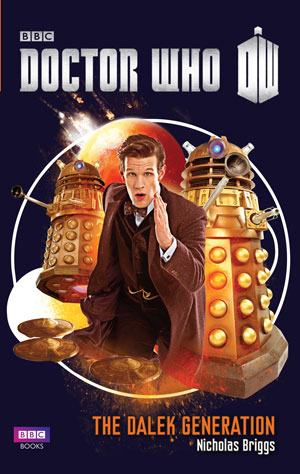 The Doctor has been on many adventures and seen many things, but never in all his days has he encountered a group of people who regard the Daleks as saviors and . . . nice. Doctor Who: The Dalek Generation takes the eleventh Doctor on a whole new adventure as he finds himself in a position where his wits and knowledge may not be enough to save a group of people from themselves.
The Doctor has been on many adventures and seen many things, but never in all his days has he encountered a group of people who regard the Daleks as saviors and . . . nice. Doctor Who: The Dalek Generation takes the eleventh Doctor on a whole new adventure as he finds himself in a position where his wits and knowledge may not be enough to save a group of people from themselves.
Nicholas Briggs does a good job of bringing the Doctor to life on paper. He’s as silly, rambly, and secretive as usual, but The Dalek Generation does introduce a complication that throws the Doctor off his game when his companions for this tale become three young children: Ollus, Jenibeth, and Sabel. The trio are remarkably different, placing demands on the Doctor as their defacto babysitter while he rushes around trying to save the day. While I wouldn’t want to see companions this young become a norm, as a one-shot story this worked out perfectly, thrusting the Doctor into the caretaker role he is ill-prepared for and presenting scenarios that trip up the Doctor, breaking his usual cool, know-it-all persona. The dynamic between these four characters is entertaining and plays off the eleventh Doctor’s more goofy personality well. The Daleks are the Doctor’s number one nemesis, and Briggs did a great job bringing them to life, as well. I could hear that classic Dalek voice with every line, and the Daleks’ new approach demonstrates aptly how they’re able to support their firepower with some well laid out plans, which is undoubtedly more dangerous to the Doctor than force fields and death rays.
While the interactions made it a fun ride, the Doctor feels like he has little control or input in this adventure. Were it a tabletop RPG, I’d have accused the GM of railroading the story and badly. While I can appreciate the Doctor’s situation going from bad to worse, it’s his cleverness and tenacity that usually saves the day, not blind luck. The book doesn’t really feel like it gets underway until more than halfway through, and what comes before is little more than a jumble of components. Meanwhile, the writing is pretty typical for a novel based off a television series, which is to say the language can be a bit stuffy and adjective heavy at times, but Briggs captures the voices of the characters and introduces a lot of fun and original elements to the Doctor Who universe, which more than makes up for the language.
For Whovians having trouble making it week to week to get their fill of the Doctor’s adventures or those looking for a truly refreshing change to the dynamics between the Doctor and his companion(s), The Dalek Generation is an excellent read. Remember, it’s the Daleks who aren’t trying to exterminate you that you should be truly worried about.

